David Cameron is to convene a series of meetings with backbench Tory MPs in the coming weeks in an attempt to head off the threat of a possible leadership challenge, amid rising concern in Conservative ranks that he lacks a convincing strategy to contain Nigel Farage's rampant UK Independence party.
Conservative backbenchers were expressing fears on Saturday that Ukip – which leapfrogged the Conservatives into second place in Thursday's Eastleigh byelection – represents a serious threat to their support not just in the south of England but also in the north, where the Tories face a struggle to defend a number of key marginal seats at the 2015 general election.
Farage, who is fielding a record 2,000 candidates in May's local elections, told the Observer that his party, traditionally strongest in the south, was building support in the north by the week – at the expense of the Conservatives.
"I think the Tories are heading the same way in the north of England as they did in Scotland, where they were wiped out," he said. "I think in 2015 it will be Ukip which is the real opposition to Labour in the north."
One senior Tory said the party faces a "devastating pincer movement" from Ukip in a string of marginal seats where Conservatives won in 2010 with narrow majorities over Labour: "If more Tory votes are siphoned off to Ukip, and Lib Dems switch to Labour, we will be done for in those seats and our position in the north of England will be terrible. We need to address this urgently."
Another prominent force on the backbenches warned that Ukip was a far more dangerous threat nationally because, as it showed in Eastleigh, it was broadening its message beyond mere hostility to the EU to a range of "natural Tory issues", including immigration and the linked pressures on jobs and public services resulting from the influx of foreign workers.
Farage added that Ukip had won three recent council byelections in the north and predicted that in many parliamentary seats it would increase its percentage of the vote in 2015 from low single figures to closer to its current poll ratings, which have been as high as 15%.
Philip Davies, the Tory MP for Shipley, said it was clear that the double threat of Ukip and a move to Labour by Lib Dem supporters was a serious threat. "I think that combination is a difficult one, without a doubt," he said.
In an attempt to reassure restive MPs, Cameron, who is often accused of ignoring all but his most trusted inner circle of advisers and MP friends, is convening a series of "sandwich lunch" meetings with groups of 20 or so backbenchers in the coming weeks, to gauge opinions and convince them that the answer to Ukip will not lie in a hasty lurch to the right.
Writing in the Sunday Telegraph, Cameron makes clear that there will be no drastic or sudden change of direction, and that he will not bow to the demands of MPs who want him to abandon the ringfence around spending on international aid or the NHS.
"We are on the side of those who want to work hard and get on in life," he writes. "But the battle for Britain's future will not be won in lurching to the right, nor by some cynical attempt to calculate the middle distance between your political opponents and then planting yourself somewhere between them.
"That is lowest common denominator politics – and it gets you nowhere. The right thing to do is to address the things people care about; to fix yourself firmly in what Keith Joseph called the 'common ground' of politics. And that's what we have done."
However Cameron's promise came as Chris Grayling, the justice secretary, indicated the Tories would repeal the Human Rights Act if they won the next general election, a pledge designed to win back voters who have defected to Ukip. The legislation was introduced under Labour and is unpopular among Tory backbenchers who complain it opens up British law to interference from Europe.
Meanwhile Cameron, addressing what he sees as Ukip's opportunism, says that consistency and an ability to take tough decisions will be key: "We are engaged in a battle for Britain's future … it is a battle we will only win if we reject the cynicism, the political calculation and the easy ways out – and stick to the course we are on."
While few Tory MPs believe Cameron is in imminent danger, many believe there could be moves to oust him this year unless this month's budget reassures people over the economy and there is a convincing campaign in May's elections.
Another crunch could come after next year's European elections, from which Ukip is confident of emerging with the highest share of the vote.
Pressure will focus increasingly in the next fortnight on the chancellor, George Osborne. There will be calls from some Tory MPs for him to cut taxes to help hard-working families – to be paid for with further spending cuts to the welfare budget.
Many MPs have also suggested he announce a further postponement of fuel duty rises, and others want measures to cut energy bills, including the abolition of green levies. Tracey Crouch, MP for Chatham and Aylesford, said: "Quite a lot of these costs are now too high for ordinary working families and we have to think about that." But with little or no money in the kitty, Osborne has little room for manoeuvre.
The Tories are taking comfort from opposition leader Ed Miliband's "One Nation Labour" message failing to resonate in Eastleigh, and stress that the party, which came fourth and failed to increase its vote significantly, also lost votes to Ukip.
Former Tory party vice-chairman Bernard Jenkin said the problem for all parties was that people had lost faith in politicians. He insisted a leadership challenge against Cameron was "for the birds" and would achieve nothing, and warned his party against thinking that there could be a quick policy fix.
He said: "This is not a crisis for a government: it is a crisis of governance. Politicians talk about fixing things like immigration, like over-regulation, like high taxation, but they seem powerless to deal with it."
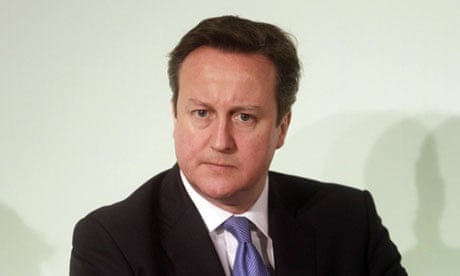

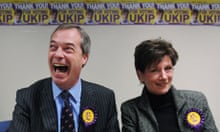
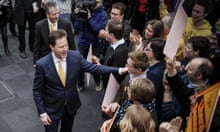
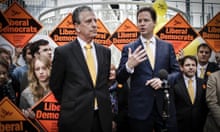
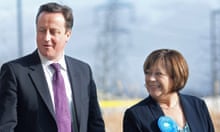
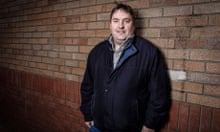
Comments (…)
Sign in or create your Guardian account to join the discussion